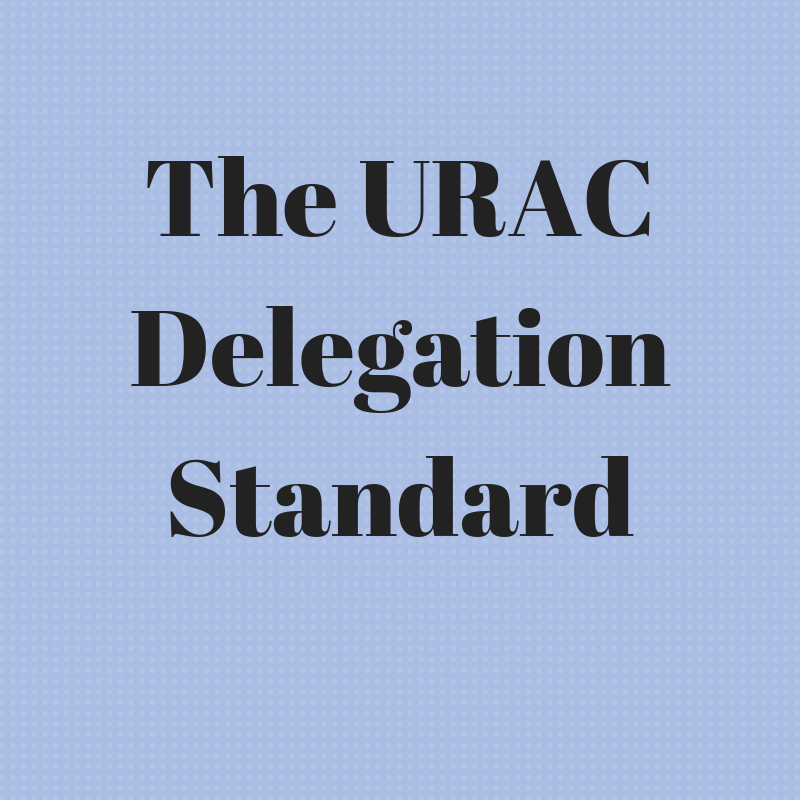Our last URAC Blog addressed changes to the Delegation Standards. We want to follow up on that with information from the URAC August 23rd Webinar on the Delegation Standards changes. There are some changes that need to be emphasized.
There are changes in definitions, and three of the important ones are as follows:
Contractor (revised definition): An external United States corporation, contracted to perform business functions within the scope of this Accreditation on behalf of the Applicant or Accredited Organization.
Deborah Smith, RN, the program presenter for URAC, clearly stated that Delegated Contractors cannot be off-shore contractors. She further stated that URAC will not be accrediting off-shore organizations in the future. If your organization is contracting with off-shore companies to provide services, you should contact your URAC account representative to further confirm this with URAC.
Ms. Smith further stated that the term, “Contractor” would be used in reference to companies with whom your organization contracts for the Delegated Services. The term, “Vendor” is to be used for all other services for which your company may contract. Vendor is a new definition.
Vendor (new definition): An external entity that sells to the Applicant or Accredited Organization products or services not within the scope of the Standards.
As you review your current policies and draft new ones to meet the revised standards, be sure to check for how you use the term Vendor and Contractor.
Eligibility (new definition): Eligibility for Accreditation requires that at least 50% of the program Standards/elements of performance are applicable to the organization. Delegated functions remain applicable. For Accreditation programs that include separate Core Standards plus the Module covering the healthcare function, the rule is applied to the Module only. Where Core Standards are embedded into the Module, they are counted. To determine if the organization meets this eligibility requirement, elements of performance which are mandatory and/or scored are counted.
The Eligibility definition received the most questions during the Webinar. As an example of how to count the 50% — if you are an organization applying for Health Utilization Management (HUM) Accreditation, there are 40 CORE Standards and 41 HUM Standards in the Module. You cannot count the Standards in the CORE toward your 50%. If your organization does not perform appeals, HUM program standards 33-41 do not apply. Your organization would comply with 32 HUM Standards or 78%. You are over the 50% threshold. In regard to Delegation, if a Delegated Contractor’s Scope of Work is the performance of 12 of those HUM Standards, you still use the 78%, as you can count the work the Delegated Contractor performs for you toward your percentage.
Oversight of Delegated Contractors is strengthened in these standards. As I wrote in the last blog, you must designate a responsible person in your organization for each Delegated Contract. Their name and title must be submitted with the URAC application along with the Contract or Agreement which must include a list of functions to be performed by the contractor. This can be an attached Statement of Work (SOW), list of delegated functions, applicable URAC standards/elements of performance, and any associated exhibits or documents referenced in the agreement as needed to verify the delegated functions. You must also provide proof of the contractor’s accreditation or certification, if the contractor is URAC accredited or certified for the delegated functions. This is an important point – there are many types of URAC accreditation. To be considered a URAC accredited contractor for your organization the accreditation must cover the functions you are delegating. For example, if you contract for Internal Reviews with an IRO who is only accredited for External Reviews, they are not a URAC Accredited Contractor for your purposes. You can still use them, but will have to have an oversight plan. Just obtaining a copy of their External Review Accreditation is not sufficient.
The Webinar also outline changes in the contracts or agreements. Unfortunately, space does not allow for us to go into that topic and it will be covered in another edition of our Blog in the near future.
About the Author:
Carolyn Gray has 30+ years of healthcare management, quality management, credentialing and consulting experience encompassing work with health plans, IROs, short and long term acute care hospitals, rehabilitation facilities, and accreditation surveys. She has assisted clients, including start up health plans and hospitals, with 55 applications and surveys for URAC, Joint Commission, HFAP, CARF, Medicare, NCQA, and various state surveys; all of which successfully achieved accreditation. Carolyn’s ability to simplify the interpretation of regulations and standards for client staff is one of her strong skills.
About Professional Services Network, Inc.
Professional Services Network, Inc. (PSN) works with clients nationwide in the search and recruitment of experienced healthcare professionals in managed care and clinical roles for temporary assignments and direct hire opportunities. Additionally, PSN’s consultants work with organizations and providers seeking accreditation or re-accreditation with URAC or NCQA. For additional information regarding our services contact us at 301-460-4089 or email us at [email protected].





